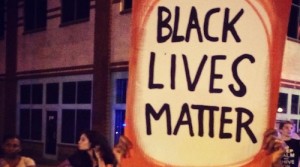
I have struggled with the theme of “Black Lives Matter” in the protests against police killings of Black men in America. I totally agree with the sentiment, but I have just had trouble with the message that seems so basic and demands a low bar. Then after an argument with a friend who thought the theme was ridiculous, I found myself defending it and eventually fully embracing the notion that one of our biggest challenges is that so many people in this country devalue the life of Black youth. But it is much more than police killings.
I watched the March and rally organized by Reverend Al Sharpton in the nation’s capital recently. Toward the end of the event, he brought up numerous families of the countless Black men murdered by police in cities throughout America. It was a stage full of pain. The mothers of Michael Brown, Eric Garner, Trayvon Martin, Tamir Rice, Amadou Diallo and many more. It inspired great emotion and passion.
Somehow, the everyday injustice in America does not evoke the same response. Gross racial disparities in arrests, prosecutions, incarceration, violations of probation and parole, and sentencing destroy millions of Black lives. Though the magnitude is much greater, it does not inspire the level of anger that a video of a White officer murdering a Black man does.
America incarcerates a greater percentage of Black people than were jailed in Apartheid South Africa. There are more Black people in America’s prisons than were enslaved in 1850. And though many articles are written, great books are published, and talk shows discuss the subject, we have not seen the type of organizing, outrage, and protest that we have for police shootings.
Black Lives Matter is the appropriate cry for this injustice. America would never stand for a million White people incarcerated for drugs and other non-violent offenses. But when Black youth from poor neighborhoods are arrested, detained, given draconian sentences and locked away, we ignore it.
Even though research shows that White and Black people use drugs at approximately equal rates, Black people are 10 times more likely to be sent to prison for drug offenses. Black Americans represent 56 percent of those incarcerated for drug crimes, even though they comprise only 13 percent of the U.S. population.
A ground breaking report, “The Essence of Innocence: Consequences of Dehumanizing Black Children,” published earlier this year by UCLA researcher Phillip Atiba Goff, showed the overwhelming prejudice and unconscious dehumanization of Black people held by Whites. Researchers conducted several experiments with mostly White police officers and White undergraduate students. The alarming results were that the White police officers and even the students viewed Black children as much older, less innocent, and more animalistic.
“The evidence shows that perceptions of the essential nature of children can be affected by race, and for Black children, this can mean they lose the protection afforded by assumed childhood innocence well before they become adults,” one of the researchers involved with the study said.
This dehumanization of Black youth leads to the extreme disproportionality we see in the criminal justice system.
Even locally the disparities are stark. In Alameda County, Blacks constitute just 12 percent of the population, but Black youth make up half of all youth in the juvenile justice system here. In a report conducted last year by the Black Organizing Project, ACLU, and Public Counsel, it was revealed that Black youth are on average 73.5 percent of all juvenile arrests in Oakland each year, even though they only make up 29.3 percent of the city’s population.
So I urge the protestors in cities around the country who have brought national attention to the great need for increased police accountability to maintain their vigilance. But I also humbly suggest that they focus their attention on why Black lives must matter in the criminal justice system.
Focus some of that outrage and organizing on local policy makers. In addition to calling for greater police accountability, hold local District Attorneys accountable for unnecessarily charging youth as adults, hold probation and parole departments accountable for arbitrary revocations and other decisions that lead to incarceration, hold state legislators accountable for draconian sentencing laws, and hold courts accountable to offer more diversion programs. But especially, use that power of protest marches and civil disobedience to apply pressure to local elected officials to take the many millions of dollars spent on incarceration and reinvest those resources directly into impoverished communities of color. Show that Black lives really do matter!
David Muhammad is the National Director of Justice Programs at the National Council on Crime and Delinquency. David is the former Chief Probation Officer of Alameda County and the former Deputy Commissioner of Probation in New York City.




